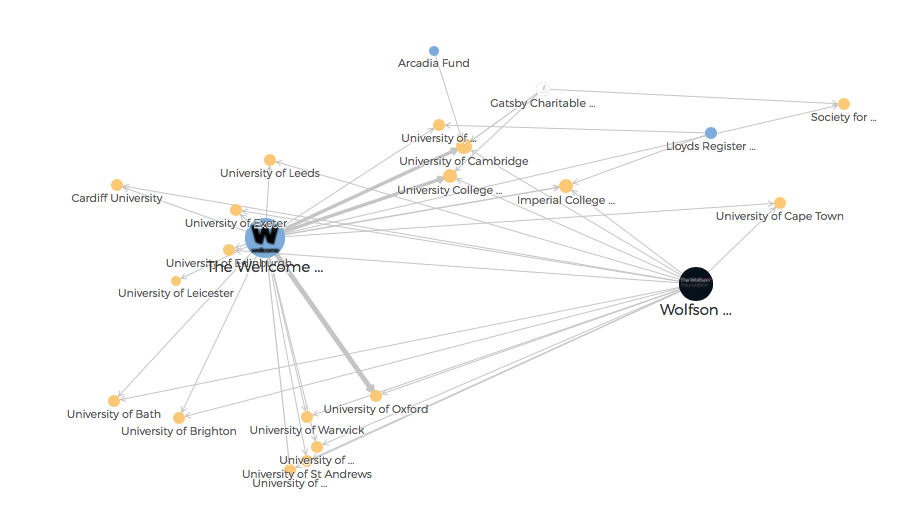Who funds science and research in the UK?
The UK’s largest charitable funder, the Wellcome Trust, has recently shared data on the billions of pounds worth of grantmaking it has made since October 2005. Although Wellcome already shared its grants data on its own website, having the data in the 360Giving Standard allows us to see these grants alongside grants from other funders, making it easier to explore science funding and gain a more holistic understanding of the research funding landscape.
In this blog, we analyse grants data for five major funders of science and research activities in the UK – Arcadia Fund, Gatsby Charitable Foundation, Lloyd’s Register Foundation, Wellcome and the Wolfson Foundation.
In 2016, these five grantmakers awarded £874 million to 354 organisations globally, with the majority being UK universities. We found that:
- Wellcome funded 315 of the organisations, confirming its status as the UK’s largest independent grantmaker.
- Of the remaining 39 organisations, 17 were funded by two or more of the grantmakers.
- The most popular grantee was the University of Cambridge, which received grants totalling £112 million from four of the funders. It also received the biggest single grant of £84 million from Wellcome.
This network graph shows the 17 institutions that are funded by more than one grantmaker and the amount that was awarded. The thicker the line, the bigger the funding flow.

How did we do this analysis?
We took the raw 360Giving data for Arcadia, Gatsby Charitable Foundation, Lloyds Register Foundation, Wellcome and the Wolfson Foundation and using the headers in the Standard schema, we made a new dataset of science funding.
Arcadia, Gatsby and Wolfson also award grants to the arts and humanities, so we had to filter their grants. Wolfson uses the Grant Program Title field, which helped us to filter only for grants to science and medicine. Arcadia uses a classifications field to classify its grants, so we only looked at grants made under its environment programme (which includes funding for scientific research). Gatsby doesn’t use classifications or the grant programme field, but as it awards a small number of high value grants each year, it was easy to identify its funding to neuroscience or plant science, the two main science fields it supports.
Using the Grant Programme or Classifications fields in the 360Giving schema is helpful for data analysts as it means they can filter the data more easily and create more accurate analysis. At the moment, just over half of 360Giving data includes these two fields, and we will be encouraging more organisations to use them in the future.
This analysis is a snapshot we produced using the current 360Giving dataset. As more science and research funders open up their grants data in the 360Giving Standard, the better and more accurate analysis we can create.
Do you want to create your own sector mapping? Come and talk to us and we’ll show you how: labs@threesixtygiving.org
